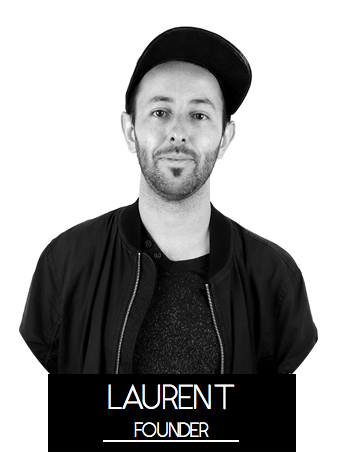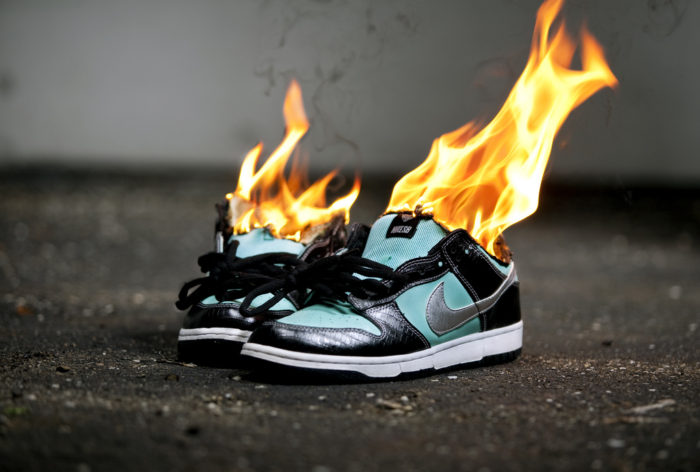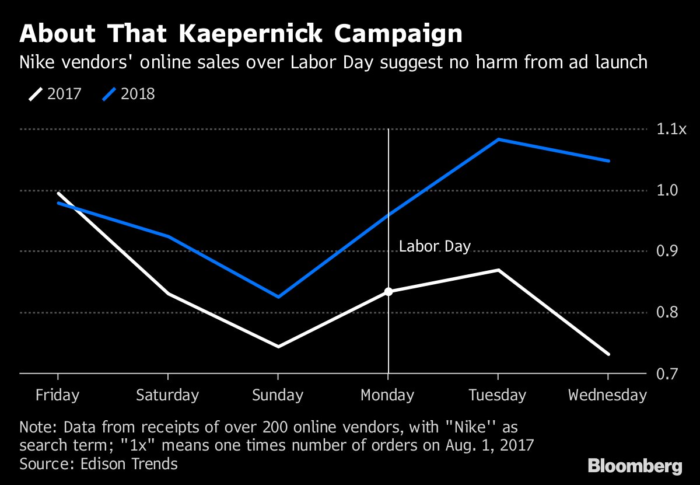As the dust settles on Nike’s latest ad with Colin Kaepernick as the face, what effect did it really have on the brand? Did it increase or decline sales, what happened to the brand’s market share after the ad, and most finally how did the public react to the so-called ‘controversial’ advert.
For those of you who have been living under a rock for the last couple of weeks, we’re of course talking about what is probably the most divisive campaigns of this year; with a huge amount of people taking to social media to praise Nike’s forward thinking and social positioning with the campaign, while others have taken to burning their Nikes.
Nike used to focus on performance: but performance is very short-term…
Much has been said and written about Colin Kaepernick x Nike campaign. Figures don’t lie, and in the short-term, the collaboration proved its efficiency. Fact.
Not the first time the two sides work together
 Nike has already been working with Kaepernick as far as 2013, following Nike’s commitment to helping American youth lead “more active and healthy lives”. A step toward a brand positioning which matches consumers’ latent demand, Nike’s capabilities and a long-term opportunity for the brand. Kaepernick declared in 2013
Nike has already been working with Kaepernick as far as 2013, following Nike’s commitment to helping American youth lead “more active and healthy lives”. A step toward a brand positioning which matches consumers’ latent demand, Nike’s capabilities and a long-term opportunity for the brand. Kaepernick declared in 2013
“Anything you can do to help yourself be better in the future is something you want to do. And I think that’s something that has helped me get to where I’m at today.”
2018 film: a brand positioning with a timely upgrade
We often tend to give brands a genuine purpose, even entering the political arena for the common good. My point of view is that it’s not exactly what’s happening with Nike. Not that Nike is not facing full-stack President Trump political soul (so to say); but his mandate will finish in 2 years, making him a far lamer duck, when Nike needs to think very, very long-term. When Nike shared its press release, the brand did not mention one enemy: it focused on a value proposal for the consumers regarding the picked individuals:
“All leverage the power of sport to move the world forward”; a very strong positioning which bets it’ll meet the right audience.
Meeting the right audience is not a political choice: it’s business
Nike used to focus on performance: but performance is very short-term, and in a sense, unrelatable in its first acceptation; when people run with Nike+, it’s not to become world champions but probably to feel good in the long-term. By slightly moving to this new positioning, Nike extends its potential reach: suggesting the products, the platforms to help consumers ‘optimize’ their daily lives.
It can resonate very strongly in the US: when the government reduces its investment for the general public, the individuals need to take care of themselves: private insurance, inner circle dependency (therefore fragility towards risks); in a sense, Nike replaces some US government desertions.
It also resonates very strongly beyond the US: a consensual motto which taps into growing generations of current and future consumers; structurally, diversity should become the new normal – at least we hope – and Nike is already proposing a shared mission with them.
And in a more cynical way: it also proves that it’s not because you’re an active athlete that your voice does not count anymore; a bit like Adidas frequently uses Stan Smith to make consumers dream and connect.
Mind the irreproachability factor: pay your tax!
But be careful Nike: with such an ambition comes – very – strong responsibilities. For the end-consumers (like me), it’s still not 100% clear what happens in Asian factories; I still find Nike’s attitude in the Paradise Papers extremely shocking. And this feeling can’t be solved by brand positioning and targeting: it can be solved by a zero tolerance on all things that don’t serve consumers turned shareholders of your reputation.

The emotional community that is the basis of Nike is obviously sportsmen and urban artists and a lot of them come from the black community which is deeply committed to civil rights action.

This whole ad campaign could be seen as a pretty big risk, but actually, Nike is making one of the smartest fashions & culture business bets: the Black-American community.
Brand Community: Nike and the black-American community
This brand move began 22 years ago, with the International basket legend Michael Jordan with the famous sentence: “Republicans buy sneakers too”. Which gave the brand a strong likability within the Black-American community. This was the first Nike open up the brand.
Ian Schafer Founder and Fmr. CEO who used to work with Nike said about “Kaepernick-gate”:
“They’ve now come to the realization that the people who wear that product namely you know certainly like athletes and skateboarders, they are urban artist, civil rights icons who contribute positively and shape culture.”
The emotional community that is the basis of Nike is obviously sportsmen and urban artists and a lot of them come from the black community which is deeply committed to civil rights action.
Black American icons have been targeted as a brand community for Nike.
“It is not very likely that angry white 40 plus years old men are gonna be the ones that are actually creating culture”.
To remind everyone that Nike is still a transnational company: according to Apex Marketing group the Kaepernick campaign created 43 million worth in buzz for Nike in less than 24 hours. Yet, they still have racial, gender, sexual harassment issues in the company.

And in the same year, Nike has signed another 8 years sponsorship with the NFL.



